For Future Parents and Future Surrogates
Everything You Need to Know About Surrogacy in Houston Texas


What Is Surrogacy?
❓ What Is Surrogacy?
Surrogacy is an arrangement where a woman — called a surrogate — agrees to carry and give birth to a baby for someone else, known as the intended parent(s).
After the baby is born, the intended parents become the child’s legal parents.
👶 Two Main Types of Surrogacy:
- Gestational Surrogacy (most common):
- The surrogate is not biologically related to the baby.
- The embryo is created using IVF (in vitro fertilization) from the egg and sperm of the intended parents or donors.
- Traditional Surrogacy (less common):
- The surrogate uses her own egg, making her the biological mother.
- This type is legally more complex and rare today.
🌈 Why Do People Choose Surrogacy?
- Medical conditions preventing pregnancy
- Same-sex couples who want to become parents
- Single parents by choice
- Infertility issues
Discover Everything You Need to Know in One FREE Guide
Thinking About Becoming a Surrogate
Learn how surrogacy works, who qualifies, what to expect medically and emotionally—and whether this life-changing journey is right for you.
Over 50 pages of expert guidance and real insight

How Much Do Surrogates Really Make In Houston TX? 💰✨
In Houston, TX, first-time surrogates typically earn between $45,000 and $60,000, with experienced surrogates making even more. 💰
Additional bonuses and reimbursements (for travel, maternity clothes, medical procedures, etc.) can add $5,000–$15,000+ on top of the base pay. ✨
What Is Required to Be A Surrogate in Houston Texas?
Age: Between 21 and 41 years old.
Previous Childbirth: Must have previously delivered a child of your own.
Successful Pregnancy: Must have had at least one uncomplicated, successful pregnancy and birth.
C-Sections: No more than 3 previous C-sections.
BMI: A BMI of 35 or lower. (BMI Calculator)
Residency: Must reside in the United States in a surrogate-friendly state. We cannot accept gestational carriers from Nebraska, Louisiana, or outside the US.
Family Support: Must have the support of your family. If married or partnered, your partner must also be supportive of your decision.
Comfort with Injections: Must be comfortable with medical injections as part of the IVF process.
Willing to Travel: Must be willing to travel to a fertility clinic for the IVF process.
Background Check: Must pass a background check.
Lifestyle: Must not use illegal drugs, smoke cigarettes, or abuse alcohol.
How Much Does Surrogacy Cost in Houston Texas?
In Texas, the total cost of surrogacy for intended parents typically ranges from $90,000 to $140,000.
This includes:
- 💸 Surrogate compensation ($45,000–$60,000+)
- 🏥 IVF & medical costs
- ⚖️ Legal fees
- 🔄 Agency fees, screening, and coordination
- 🔐 Insurance, travel, and other reimbursements
The exact cost depends on factors like the agency, location, insurance coverage, and whether it’s your first journey or not.
Do I Get Paid More for Carrying Twins in Houston Texas?
Yes — most surrogacy agreements include additional compensation if you carry twins or other multiples. This is because multiple pregnancies involve:
- More medical appointments and monitoring
- Higher physical demands on the surrogate
- Increased risks of complications and earlier delivery
The exact amount varies by agency, location, and contract, but it’s usually an extra $5,000–$10,000 on top of the standard base pay. Your surrogacy contract will clearly outline the amount before the pregnancy begins.
Who Gets Custody if the Surrogate Changes Her Mind?
In gestational surrogacy, the surrogate does not have legal parental rights to the baby. The intended parents are recognized as the legal parents through a signed surrogacy contract and, in many cases, a court-issued pre-birth order.
Even if the surrogate changes her mind during pregnancy, custody remains with the intended parents. These legal protections are put in place before any medical procedures begin, ensuring that everyone understands their rights and responsibilities.
Do I Use My Own Eggs Or The Intended Parents?
In gestational surrogacy, you do not use your own eggs. Instead, the embryo is created using eggs from the intended mother or an egg donor, and sperm from the intended father or a sperm donor. This means the baby has no genetic connection to the surrogate. Your role is to carry the pregnancy and give birth, while the genetic material comes entirely from the intended parents or chosen donors. This arrangement is the most common type of surrogacy today because it keeps genetics separate from the surrogate, making legal and emotional boundaries clearer for everyone involved.
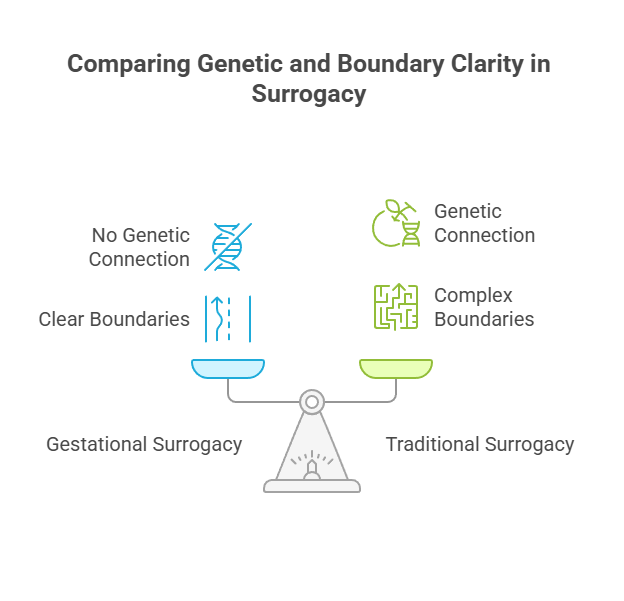
Why Is Surrogacy So Expensive in Houston Texas?
Surrogacy is costly because it involves many specialized services and professionals. In gestational surrogacy, the main expenses include IVF and other fertility treatments, surrogate compensation, prenatal and delivery care, legal contracts, agency coordination, and sometimes insurance. Each step is essential to protect the health, rights, and well-being of everyone involved.
In the U.S., total costs usually range from $90,000 to $150,000+, depending on location, medical needs, and whether egg or sperm donors are used. While the price is high, it reflects the complex, carefully managed process required to ensure a safe and successful journey for the surrogate, intended parents, and the baby.
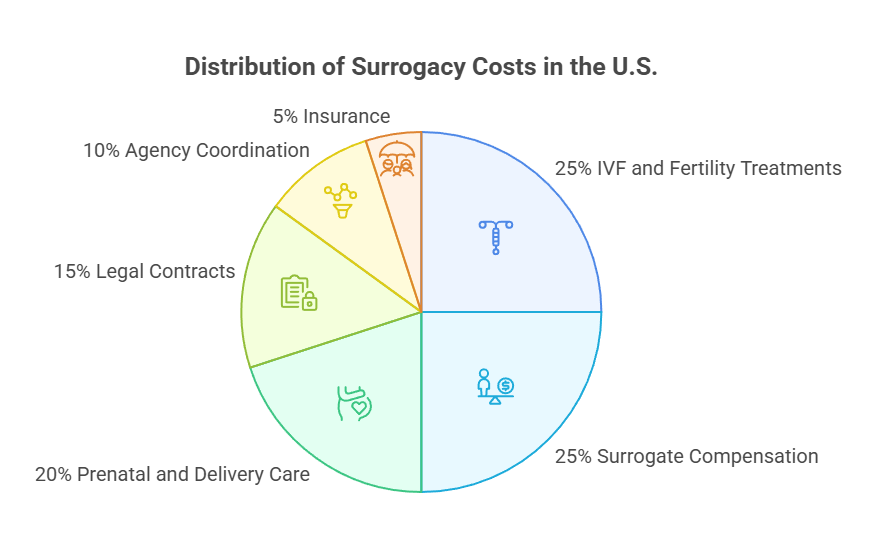
What Medical Tests Are Required to Become A Surrogate in Houston Texas?
Before becoming a surrogate, you’ll need to go through a series of medical tests to make sure you’re healthy and able to carry a pregnancy safely. These usually include:
- General Health Screening – Blood pressure, heart health, and overall physical check.
- Blood Tests – Check for infectious diseases (HIV, hepatitis, syphilis) and overall health indicators like blood count.
- Reproductive Health Exam – Pelvic exam, Pap smear, and tests for sexually transmitted infections (STIs).
- Ultrasound – To check your uterus and reproductive organs.
- Hormone Level Tests – Ensure your body can support pregnancy.
- Drug Screening – To confirm no use of substances that could harm pregnancy.
These tests protect both you and the baby, and are a standard part of the surrogacy approval process.
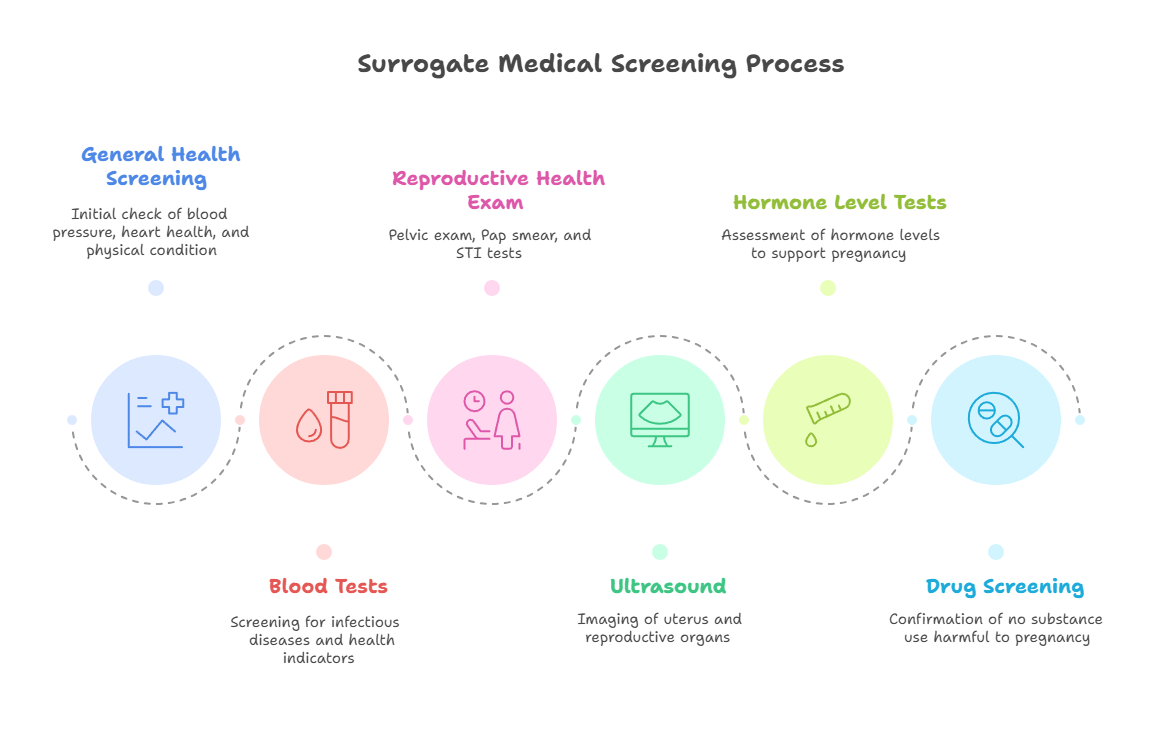
How Are Surrogates Screened And Matched with Us in Houston Texas?
The process has two main steps: screening and matching.
1. Screening
Surrogates go through thorough checks to ensure they are healthy, emotionally ready, and capable of carrying a pregnancy. This usually includes:
- Medical evaluation – Physical exam, reproductive health check, blood work, and infectious disease testing.
- Psychological assessment – To make sure they fully understand the process and can handle the emotional aspects.
- Background checks – Criminal record and lifestyle review for safety and reliability.
2. Matching
Once a surrogate is approved, agencies work to find the best fit for both sides. Matching often considers:
- Shared expectations – Number of embryos to transfer, willingness for selective reduction, birth plan preferences.
- Location – To make travel and communication easier.
- Personality and values – Ensuring comfort and trust between surrogate and intended parents.
This careful process helps build a positive, supportive relationship from the start, increasing the chances of a smooth surrogacy journey.
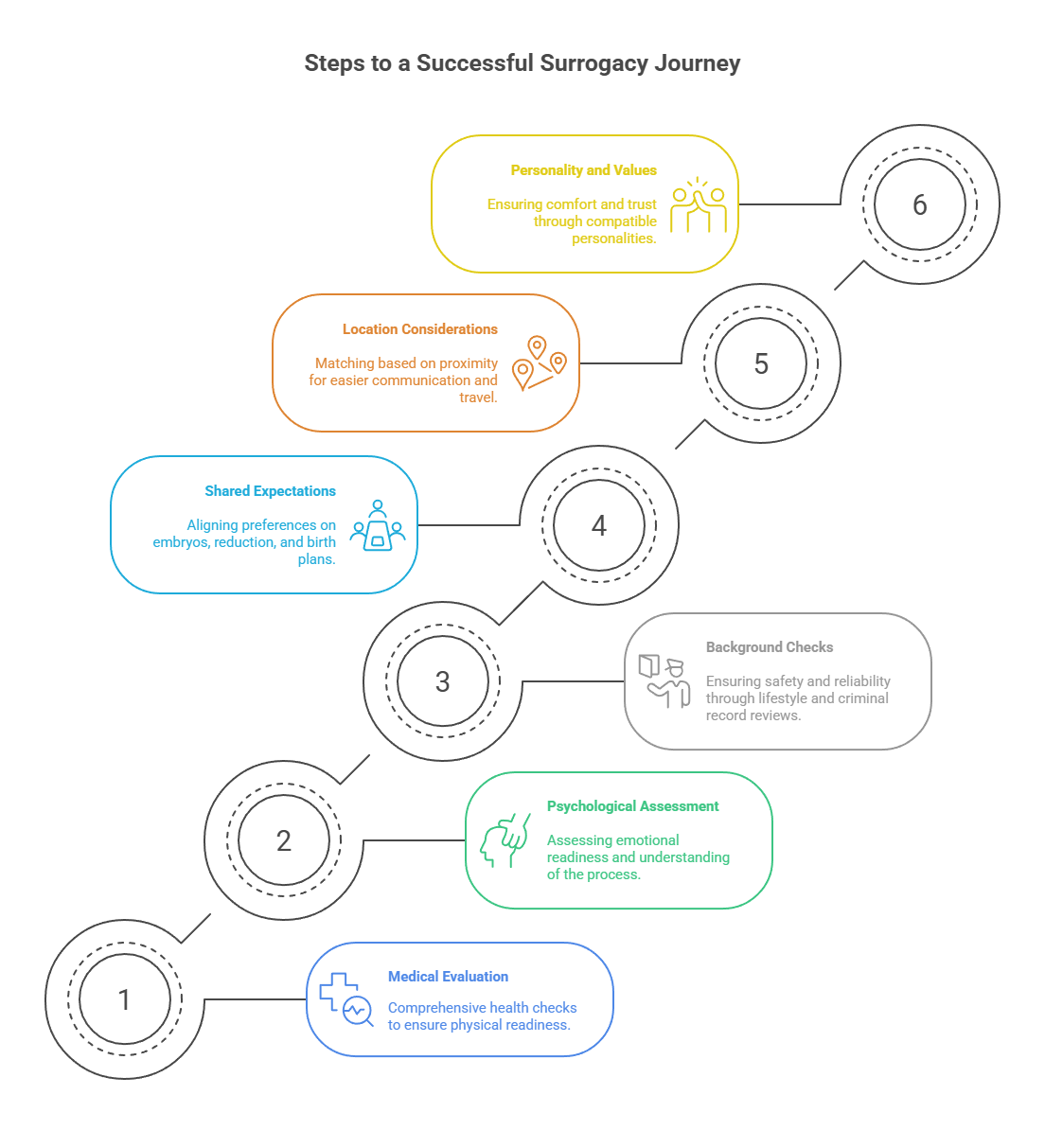
What Happens if I Miscarry or the Pregnancy Fails?
If a miscarriage or pregnancy loss happens during surrogacy, it’s heartbreaking for everyone involved. Here’s what usually follows:
- Immediate Medical Care – The surrogate receives prompt medical attention to ensure her health and recovery.
- Emotional Support – Counseling or support groups are often offered to both the surrogate and intended parents.
- Medical Review – Doctors assess what happened and whether there are any underlying health concerns before trying again.
- Next Steps – Depending on the surrogacy agreement and everyone’s readiness, another embryo transfer may be scheduled when it’s medically safe.
- Compensation & Agreements – Contracts usually outline how expenses and payments are handled in the event of a pregnancy loss.
While pregnancy loss is emotionally difficult, the surrogacy process includes medical and emotional safeguards to support everyone through it.
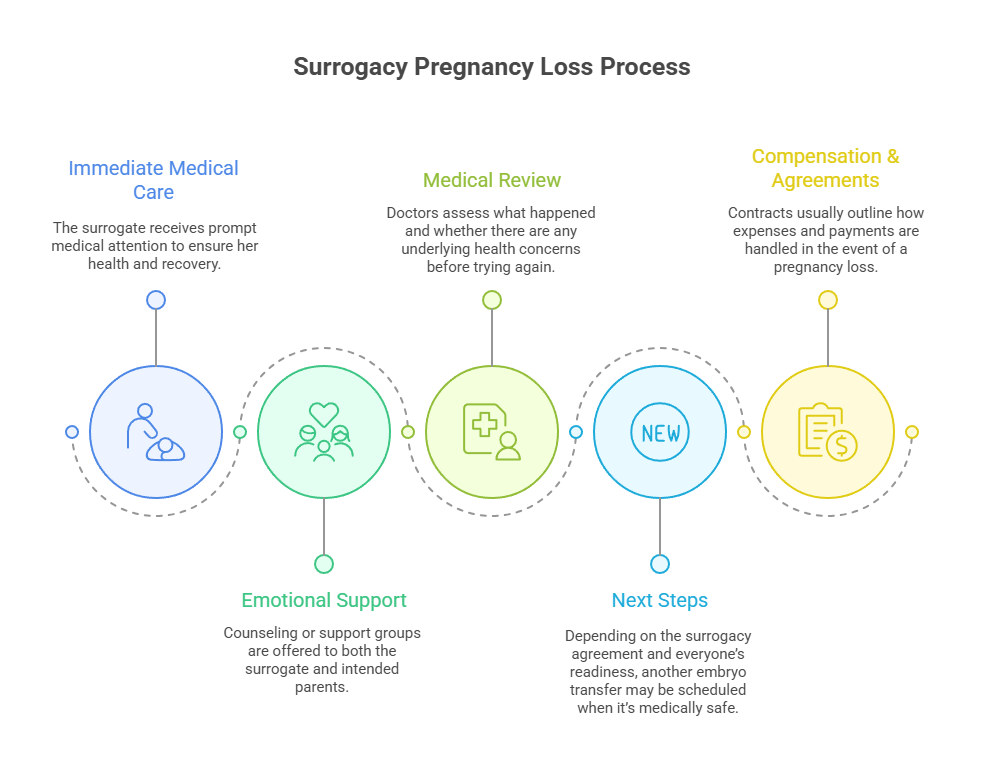
Who Covers My Medical Bills During The Pregnancy?
In a surrogacy arrangement, the intended parents are typically responsible for covering all pregnancy-related medical bills, not the surrogate.
Here’s how it usually works:
- Medical Insurance – If you have a health insurance plan that covers surrogacy-related maternity care, your bills will be processed through that insurance first. The intended parents usually pay for any deductibles, co-pays, or uncovered costs.
- If your insurance doesn’t cover surrogacy – The intended parents will either purchase a separate maternity policy for you or pay the medical bills directly.
- Prenatal care, delivery, and postnatal recovery – All standard pregnancy-related expenses (doctor visits, ultrasounds, lab tests, labor and delivery, postpartum care) are included.
- Additional procedures – If there are complications, extra monitoring, or a C-section, those costs are also covered by the intended parents.
In short: You shouldn’t have to pay out of pocket for pregnancy-related medical costs when you are a surrogate — the intended parents’ agreement and insurance arrangements are designed to protect you.
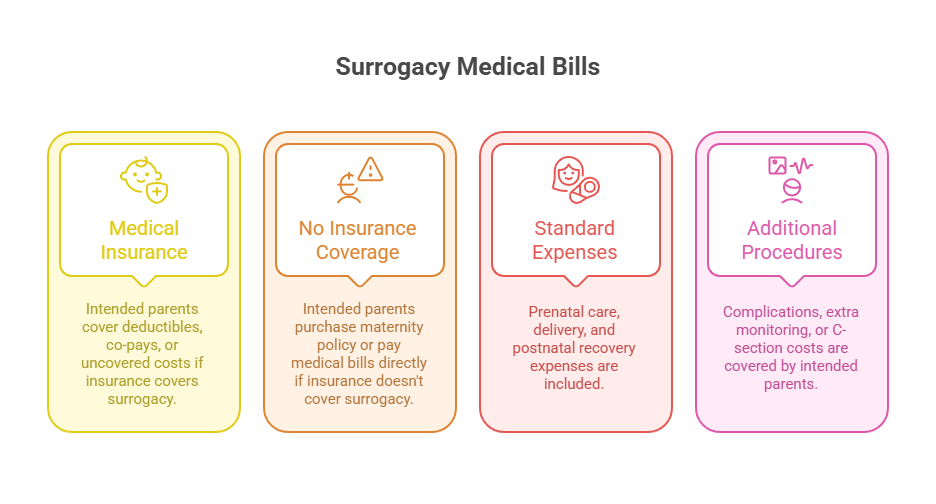
What If The Baby Has Health Issues?
In surrogacy, what happens if the baby has health issues depends on the surrogacy agreement, local laws, and the intended parents’ decisions.
Key points:
Rare Exceptions: If the surrogacy arrangement is not properly documented or local laws differ, there may be legal disputes over responsibility — which is why working with an experienced surrogacy lawyer is essential.
Intended Parents’ Responsibility: In most surrogacy arrangements, the intended parents are legally and financially responsible for the child from birth — including any medical care related to health issues, disabilities, or congenital conditions.
Prenatal Decisions: If a serious condition is detected during pregnancy, the surrogacy agreement usually outlines how medical decisions (such as specialized treatment or delivery planning) will be made. These decisions are typically led by the intended parents, in consultation with doctors, while respecting the surrogate’s rights.
Post-Birth Care: If the baby needs hospitalization, surgeries, or long-term treatment after birth, the intended parents cover those costs.
Insurance Considerations: Many surrogacy arrangements require the intended parents to have newborn health insurance ready before delivery to ensure immediate coverage if complications arise.
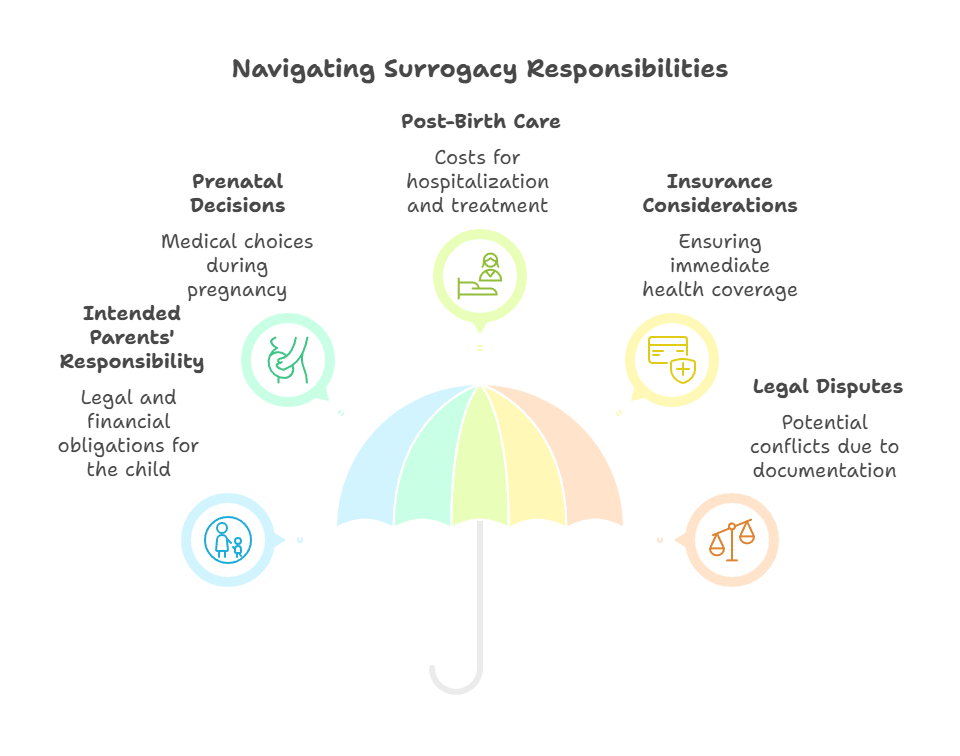
What Happens if the Surrogate Miscarries?
If a miscarriage occurs, the surrogate’s health is the top priority. She will receive immediate medical care and the necessary recovery time. Both the surrogate and the intended parents are offered emotional support, such as counseling or support groups.
Doctors will review the situation to understand possible causes and decide when it’s safe to try again, if everyone wishes to continue. The surrogacy contract will outline how expenses and compensation are handled in the event of a miscarriage.
While this is an emotional setback, the process is designed to care for the surrogate’s well-being and guide everyone toward the next steps with compassion.
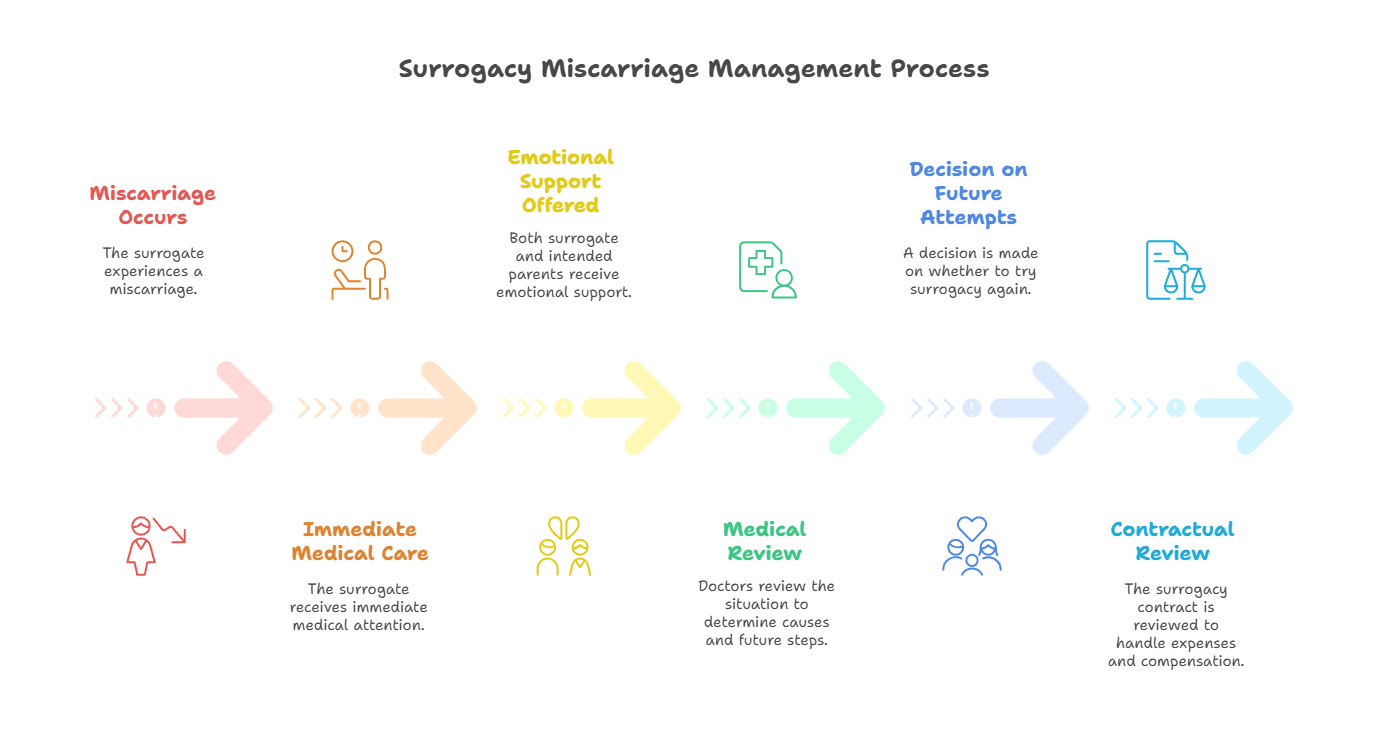
Can I Keep the Baby if I Change My Mind?
No. In gestational surrogacy, the baby is not genetically related to the surrogate. Legal agreements are signed before the process begins, clearly stating that the intended parents are the baby’s legal parents from birth. The surrogate cannot claim parental rights, even if she changes her mind during the pregnancy.
This legal protection ensures clarity and security for both the surrogate and the intended parents.
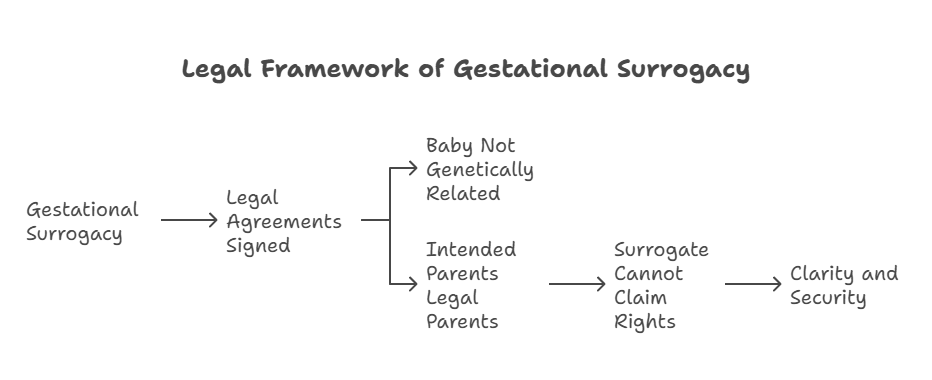
Is Surrogate Income Taxable in Houston Texas?
In the U.S., surrogate compensation is often considered taxable income, but it depends on your contract and state laws.
- If you receive payment for services (carrying the pregnancy), the IRS may treat it as taxable, and you could get a 1099 form.
- In rare cases, if the contract specifies the payment as reimbursement for medical and pregnancy-related expenses, and not for services, it may be considered non-taxable — but this is less common.
- State laws vary, and the IRS has not issued a universal ruling, so situations can differ.
Bottom line: Most surrogates report their compensation as income. It’s best to work with a tax professional familiar with surrogacy to avoid surprises.
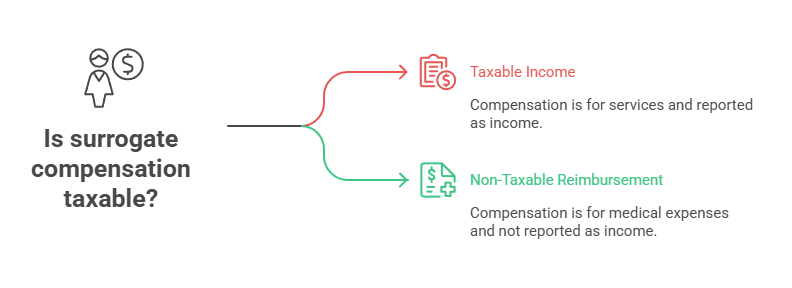
What Legal Contracts Are Needed in Surrogacy?
Surrogacy requires a legally binding contract between the surrogate and the intended parents before any medical procedures begin. This contract is usually drafted by attorneys experienced in reproductive law and includes:
- Parental rights – Confirms that the intended parents will be the baby’s legal parents from birth.
- Compensation & expenses – Outlines payment to the surrogate and how medical, travel, and other costs are covered.
- Medical decisions – Details how situations like selective reduction or pregnancy termination will be handled.
- Risks & responsibilities – Explains each party’s obligations and potential medical risks.
- Confidentiality – Protects personal information for both sides.
In most U.S. states, each party has their own lawyer to ensure fairness and understanding. Once signed, the contract guides the entire surrogacy process and provides legal protection for everyone involved.
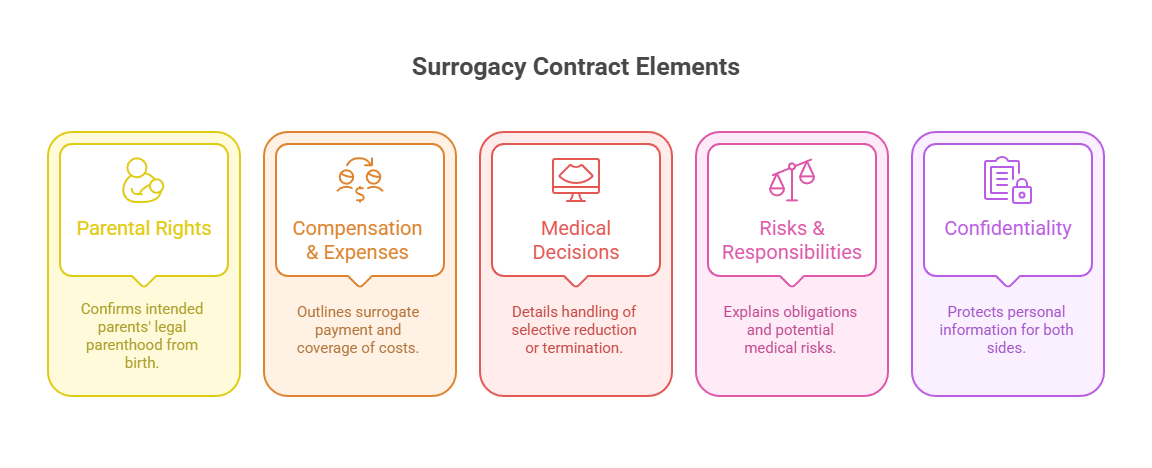
What Is The Process for Surrogacy in Houston Texas?
The surrogacy process typically follows these key steps:
✅ Step 1: Initial Consultation
⏳ 1–2 weeks
Meet with a surrogacy agency or coordinator to learn about the process, discuss goals, and determine eligibility.
✅ Step 2: Application & Screening
⏳ 4–8 weeks
For Surrogates: Medical exams, psychological evaluation, background check, and insurance review
For Intended Parents: Submit fertility records, financial screening, and legal overview
(Note: Some screenings may overlap with the matching stage.)
✅ Step 3: Matching
⏳ 2–6 weeks
Match with a surrogate (or intended parents) based on values, location, and preferences. Includes an introductory meeting before formal agreement.
✅ Step 4: Legal Contracts
⏳ 3–4 weeks
Each party has independent legal counsel to review and finalize a Gestational Carrier Agreement (GCA), ensuring full legal protection.
✅ Step 5: Medical Preparation & Embryo Transfer
⏳ 6–10 weeks
Surrogate begins a cycle of hormone therapy (typically 3–5 weeks)
Embryo transfer at the IVF clinic
Pregnancy confirmed 1–2 weeks later via blood test
(If the first cycle fails, a second transfer may be scheduled.)
✅ Step 6: Pregnancy & Support
⏳ 38–40 weeks
Regular prenatal care
Ongoing emotional, logistical, and financial support
Check-ins with both surrogate and intended parents throughout the pregnancy
✅ Step 7: Birth & Legal Finalization
⏳ 2–4 weeks (post-birth)
Baby is born according to the hospital plan
Legal parentage is finalized through a pre-birth order or court process (depending on the state)
Baby is released into the care of the intended parents
⏰ Total Timeline: ~12–18 Months
Depending on matching speed, medical cycles, and legal processing, the full journey may range from 10 to 24 months.
Does Insurance Cover Surrogacy in Houston Texas?
The short answer is: not usually—but it depends.
Here’s a breakdown for both intended parents and surrogates:
🏥 For Intended Parents:
- Most health insurance plans do not cover surrogacy-related costs, including surrogate compensation, IVF, or embryo transfer.
- However, some employer benefits (especially in tech or large companies) may offer surrogacy reimbursement or fertility grants.
- Intended parents often need to:
- Pay out-of-pocket
- Purchase a separate surrogacy-specific insurance policy
- Work with agencies to review surrogate’s insurance options
🤰 For Surrogates:
- Some surrogates already have personal insurance that may or may not cover a surrogate pregnancy.
- If not, intended parents usually purchase a maternity insurance plan for the surrogate.
- This ensures prenatal care, labor, and delivery are covered during the pregnancy.
💡 Tip:
Before starting, always review:
- The surrogate’s existing policy (line by line!)
- Legal and agency support for coverage review
- Options for secondary policies or surrogacy-friendly plans
How Much Does Surrogacy Cost with Insurance in Houston Texas?
Even with insurance, surrogacy is still a significant investment for intended parents. That’s because most standard insurance plans don’t cover the full journey, and you often need to purchase additional surrogacy-related insurance.
💸 Estimated Total Cost (with insurance):
✅ $90,000 – $130,000+
Here’s what it typically includes:
| Cost Category | Estimated Amount |
|---|---|
| 🧑🤝🧑 Surrogate Compensation | $45,000 – $60,000 |
| 🧬 IVF & Medical (incl. transfer) | $15,000 – $25,000 |
| ⚖️ Legal Fees (both parties) | $6,000 – $10,000 |
| 🛡️ Surrogate Health Insurance* | $8,000 – $15,000+ |
| 📦 Agency Fees & Coordination | $15,000 – $25,000 |
| 🚗 Travel, Maternity, Misc. Reimbursements | $3,000 – $7,000+ |
* If the surrogate’s own insurance doesn’t cover surrogacy, intended parents must buy a surrogacy-friendly policy.
✅ What Insurance Can Help With:
- Prenatal care & delivery (for the surrogate)
- NICU or complications (if policy allows)
- Intended parents may also use their insurance once the baby is born (depending on timing/legal orders)
Bottom line:
Insurance helps reduce specific medical costs, but doesn’t drastically lower the total cost of surrogacy unless you’re using very comprehensive employer benefits.
Meet Our Past Surrogates in Houston Texas
Moments of Giving












🏡 Why Houston Families Trust Us
✅ Full Transparency
We pride ourselves on proving full transparency. Our detailed expense sheets show exactly where your money goes—no hidden costs, no fine print. You’ll always know what to expect, every step of the way.
✅ Inclusivity at Our Core
Inclusivity is a cornerstone of our values. We welcome and support all families—same-sex couples, international intended parents, and single parents—with compassion, dignity, and respect.
✅ What Sets Us Apart
- No Fee Until Matched – You don’t pay a cent until we find your perfect surrogate.
- Multilingual Support – We speak your language: English, 中文, Español, and more.
- Specialized IVF Expertise – Our team is deeply experienced in fertility care.
- End-to-End Guidance – From day one to delivery, we walk with you.
- International Experience – Trusted by families from across the globe.

